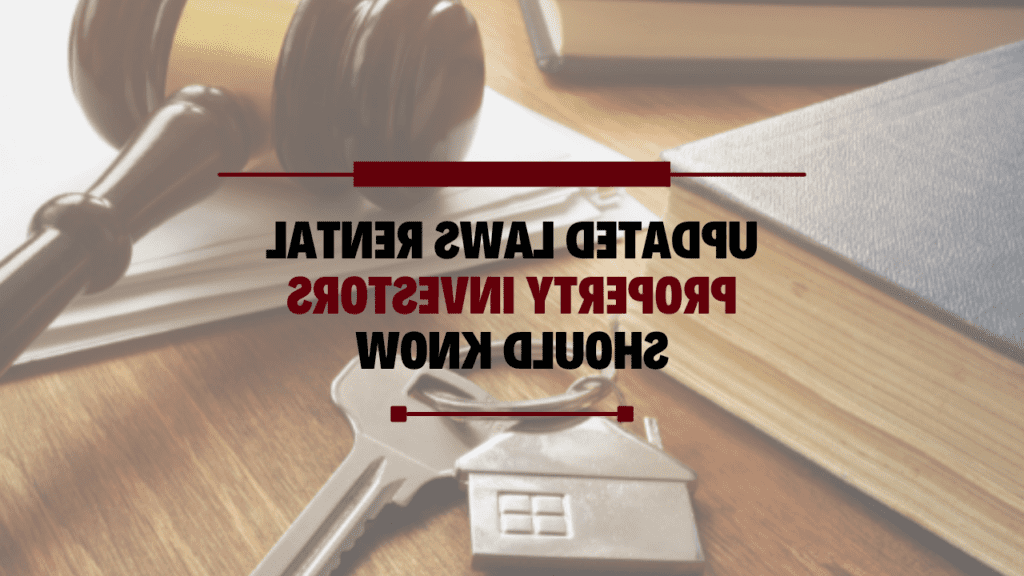
By now, you are likely familiar with The Tenant Protection Act of 2019 and all that it entails. If you’re still unsure whether your property is covered by or exempt from the rent control and just cause eviction protocols that are part of that law, talk to a Visalia property manager as soon as you can. There are limits to what kind of rental increases you can impose, and in order to lawfully evict a tenant, they would have to stop paying rent, violate the lease agreement, or conduct criminal acts in your property.
We’re not going to talk about The Tenant Protection Act today, but if you have any questions about rent control or eviction or Section 8 tenants, we’re happy to answer them. Instead, we want to update you on some of the latest laws that affect California rental properties. Here are some of the things you might have missed if you aren’t paying attention to the latest legal updates.
Landlords Can Sue for Unpaid Rent
The eviction moratorium may seem like a relic of the distant past, but it’s actually only recently that rental obligations stopped being deferred. Some local assistance programs were allowing tenants to defer rental payments until May 31, 2023.
That final deadline has come and gone, which means there is no reason that tenants should not be paying rent. In fact, from the end of 2021 forward, landlords have been permitted to sue their tenants for any unpaid rent. If you have residents with balances, you can make an effort to collect them. You can even take those tenants to court in order to get your past rents paid.
It’s as simple as starting a small claims case. If you show up for court and the judge rules in your favor, your tenant can still appeal the decision and get a new trial. Once the appeal has ended with the same judgment, you can get an order to collect your unpaid rent.
Habitability Standards for California Rental Homes
California’s Implied Warranty of Habitability requires property owners to provide a rental home that’s safe and habitable.
Your rental property can be deemed substandard if it endangers the life, health, or safety of its residents. Beginning on July 1, 2022, AB 838 went into effect. This law enforces existing habitability standards by requiring a city or county to investigate any habitability complaints from residents.
Cities cannot decide to ignore a complaint that they might consider more of a nuisance than a legitimate concern. Instead, they must communicate with residents who file the complaint and reasonably enforce the state housing laws that speak to habitability.
Emotional Support Animals and Documentation
The Fair Housing Act and the Americans with Disabilities Act (ADA) prohibits discrimination against tenants or applicants who have disabilities. There has been a rise in the need for companion animals, most commonly emotional support animals. These animals are different from service animals, but they’re also not pets. There are protected accommodations that tenants can request – even if you don’t allow pets. Emotional support animals would be exempt from a pet fee, pet deposit, or pet rent.
This has caused some frustration for landlords who claim that it’s too easy for tenants to get a physician’s statement listing the need for an emotional support animal. So, AB 468 was passed, and went into effect on January 1, 2022. This law requires that any licensed physician who provides documentation about an individual’s need for an emotional support animal must have an established relationship with their patient. That relationship must have been established for at least 30 days in order for the documentation to be accepted. The physician must also complete an in-person clinical evaluation of the individual who requests the emotional support animal.
Organic Waste: SB 1383
If you own a multi-family property with five or more rental units, you are now required to dispose of organic waste separately and in accordance with state law. Beginning in 2022, all California jurisdictions must provide organic waste collection services to residents. Here’s what the law identifies as organic waste:
- Food and food scraps
- Green material and compost
- Landscape and pruning items
- Organic textiles and carpet
- Lumber and wood
- Paper products including printing and writing paper
- Manure
- Biosolids
- Digestate
- Sludge
As a property owner, you must now subscribe to the local city’s curbside collection service for organics or you can haul the waste to a composting facility on your own. You’ll need to provide your building and your residents with a container that’s correctly labeled. You must provide the composting information on organic waste collection to your residents within 14 days of them moving into your rental unit.
Security Deposit Laws in California
If there’s going to be a legal dispute between you and a tenant, it’s likely going to be due to the security deposit. This is where we see most conflicts arise, so it’s helpful to remember what you can and cannot deduct from a tenant’s security deposit. Here are the basics around the state’s security deposit law that you must keep in mind:
- You cannot collect more than the equivalent of two months’ rent in a security deposit when you’re renting out an unfurnished property.
- All security deposits are refundable.
- You have 21 days from the end of the lease term to return the tenant’s security deposit.
- You can deduct for unpaid rent, property damage, and cleaning fees. You cannot deduct for normal wear and tear.
 Remember that if you miss the deadline or if you’re found to have made an unlawful deduction from the security deposit, you not only have to refund the entire amount, but also up to two times that amount in punitive damages.
Remember that if you miss the deadline or if you’re found to have made an unlawful deduction from the security deposit, you not only have to refund the entire amount, but also up to two times that amount in punitive damages.
When you’re withholding more than $125 from the deposit, make sure you provide an itemized list of what was deducted, and why.
We know it’s not always easy to stay up to date on the latest laws and legislation. That’s why we’re here. To protect you, inform you, and keep you compliant. If you have any questions about rental laws in Visalia or throughout California, please contact us at The Equity Group.

 Erica Navarro
Erica Navarro Ali Lanford
Ali Lanford Catalina Renteria
Catalina Renteria Neldy J. Mayorga
Neldy J. Mayorga Karen Jimenez
Karen Jimenez Andrew Woomer
Andrew Woomer Scott Ellis
Scott Ellis Chelsie Jones
Chelsie Jones Gabriella Martinez
Gabriella Martinez Les Ellis
Les Ellis Steve Duerre
Steve Duerre Daiziree Garcia
Daiziree Garcia Vanessa Silva
Vanessa Silva Crystal Duran
Crystal Duran